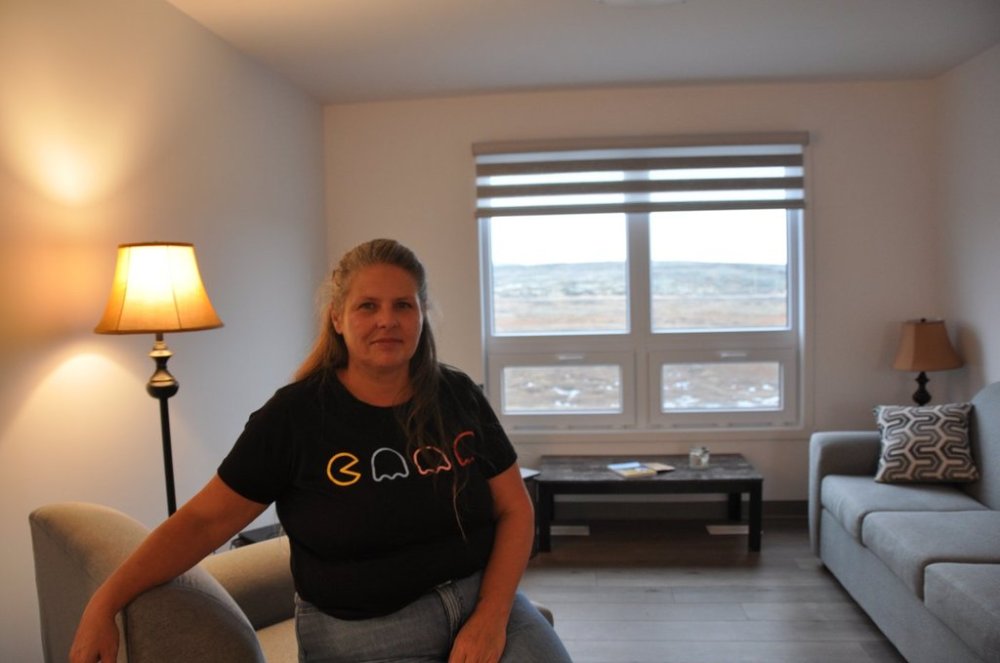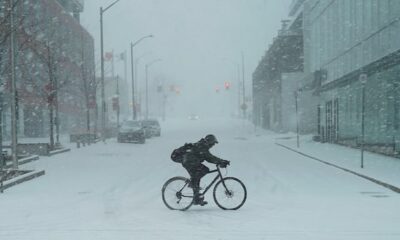Entertainment
Doctors and Nurses Depart Nunavik Amid Water Shortages Crisis

Health professionals in the Nunavik region of Quebec are leaving their positions due to persistent water shortages that have created significant challenges in providing adequate care. This ongoing issue has exacerbated a long-standing problem of staff retention in a region where healthcare workers face unique challenges.
The situation is particularly dire for those working in the Far North, where health workers can choose between the Cree communities of James Bay or the Inuit communities along Hudson Bay. According to Raphaëlle Carpentier, a nurse at the Inukjuak health clinic (CLSC), many opt for the Cree communities to access basic comforts like running water and cell service. Her colleague, Raphaelle Durand, expressed her doubts about staying in Nunavik long-term, stating, “Even when you like it… there are irritants like water where I ask myself: in 20 years will I still be able to deal with that? Surely not.”
Reports indicate that the average length of service for healthcare workers in Nunavik is merely 18 months. Durand noted that many workers experience burnout and leave after a short period. The turnover rate means that those who remain must constantly adapt to new staff, creating additional pressure on the healthcare system. “Recently, we lost a really good doctor,” Durand remarked, highlighting how water shortages contributed to the decision to leave.
The Syndicat nordique des infirmières et infirmiers de la Baie d’Hudson, which represents nurses in the region, has acknowledged recent recruitment efforts, but keeping new hires remains a challenge. Muriel Beauchamp, a former nurse at the Inuulitsivik Health Centre in Puvirnituq, now working with the union, has observed significant changes in recruitment dynamics over the years. “People don’t stay,” she said, noting that many new hires last only a few weeks before leaving.
Healthcare professionals report that the lack of water affects not just personal comfort but also the quality of care provided. Dr. Vincent Rochette-Coulombe, who practices in Puvirnituq, mentioned, “There are two types of people who work in Nunavik: those who do three weeks, and those who do three years.” He emphasized that the absence of basic amenities like running water leads to a decline in morale among staff.
Living conditions in Nunavik highlight the gravity of the situation. Residents and healthcare workers are accustomed to conserving water, often relying on emergency containers to flush toilets when water supply is interrupted. The impacts are felt across daily activities such as cooking, cleaning, and personal hygiene. Many healthcare professionals, particularly those from southern Quebec, struggle with extended periods without access to showers.
Liv Larsen, a material resources coordinator for the Inuulitsivik Health Centre, shared her experience of becoming overwhelmed after not showering for a week. “It plays enormously on the morale of the troops,” she explained. The lack of water can lead to irritability and frustration among staff, making it difficult to maintain a positive working environment.
Manon Rancourt, previously a coordinator at the hospital services department, confirmed that personnel often express a desire to return home if water shortages persist. “At some point, people get irritable and it’s very understandable,” she stated. She emphasized the contrast in living conditions between Nunavik and southern regions, where access to basic utilities is taken for granted.
While healthcare workers can periodically return to southern Quebec, Indigenous residents of Nunavik endure these challenging conditions without such reprieve. The ongoing water shortages in the region have become a critical factor affecting the well-being of both healthcare providers and the communities they serve.
This report was first published on November 23, 2025, by The Canadian Press. Katrine Desautels received support from the Michener Foundation, which awarded her a Michener-Deacon Investigative Journalism fellowship to report on the impact of water access in Nunavik’s Indigenous communities. This article is part of a series exploring the critical issues facing the region.
-

 Politics3 weeks ago
Politics3 weeks agoSecwepemc First Nation Seeks Aboriginal Title Over Kamloops Area
-

 World4 months ago
World4 months agoScientists Unearth Ancient Antarctic Ice to Unlock Climate Secrets
-

 Entertainment5 months ago
Entertainment5 months agoTrump and McCormick to Announce $70 Billion Energy Investments
-

 Lifestyle4 months ago
Lifestyle4 months agoTransLink Launches Food Truck Program to Boost Revenue in Vancouver
-

 Science5 months ago
Science5 months agoFour Astronauts Return to Earth After International Space Station Mission
-

 Technology3 months ago
Technology3 months agoApple Notes Enhances Functionality with Markdown Support in macOS 26
-

 Top Stories2 months ago
Top Stories2 months agoUrgent Update: Fatal Crash on Highway 99 Claims Life of Pitt Meadows Man
-

 Lifestyle3 months ago
Lifestyle3 months agoManitoba’s Burger Champion Shines Again Amid Dining Innovations
-

 Politics4 months ago
Politics4 months agoUkrainian Tennis Star Elina Svitolina Faces Death Threats Online
-

 Sports5 months ago
Sports5 months agoSearch Underway for Missing Hunter Amid Hokkaido Bear Emergency
-

 Politics4 months ago
Politics4 months agoCarney Engages First Nations Leaders at Development Law Summit
-

 Technology5 months ago
Technology5 months agoFrosthaven Launches Early Access on July 31, 2025





















